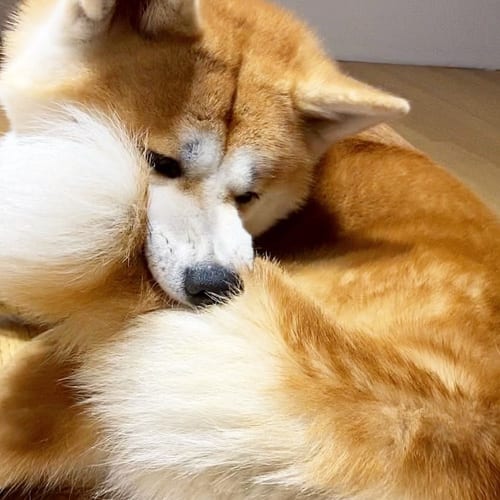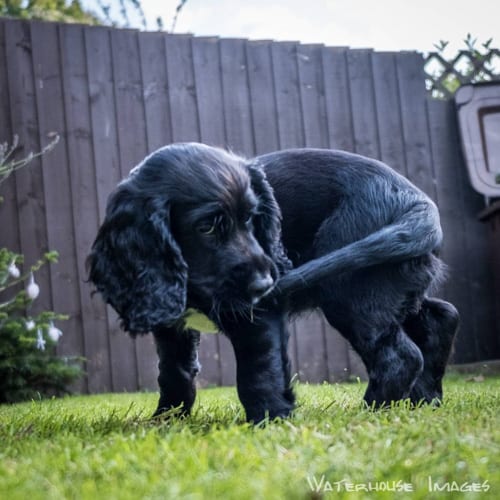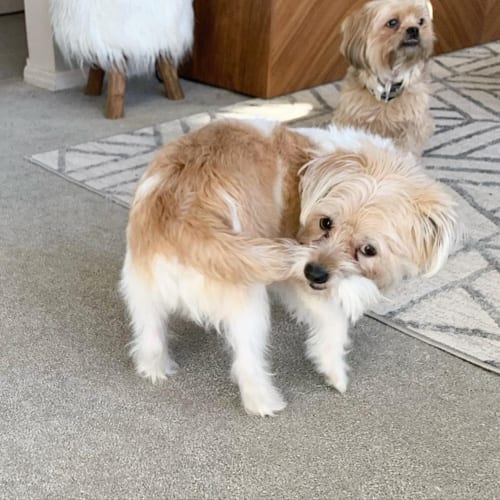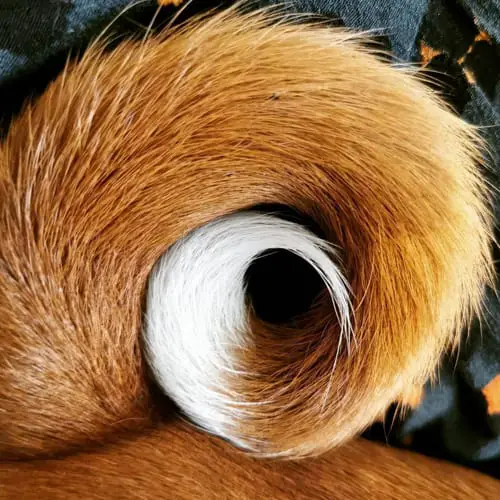Is your canine friend gnawing, chewing, or maybe biting at the bottom of his tail?
Injury, infection, stress, and allergies are among dog tail chewing or tail biting. Dogs continuously entertain us with their jokey and playful antics.
One classic routine of a canine is running in tight circles in the never-ending pursuit of his tail.
You laugh as your dog twirls around. However, the leading cause of his chasing his tail might be a serious issue. B
elow are the reasons why your dog bits or chases his or her tails.
1. Infestations of Parasite

Two of the most common seasonal dog afflictions are tick and fleas. Perhaps you already notice your dog scratching in a specific part of his body where fleas are running fast.
These pets can be treated with regular baths, medicated collars, and vet prescriptions.
Nothing is astounding for these annoying pests to dwell in your dog’s tail, making him bite or scratch it continuously.
It is the itchiness that causes too much biting of his tail. When not cured or taken for granted, this can result in whining behavior.
So, make sure to visit your vet immediately for proper treatment.
2. Some Sorts of Allergies
Dogs are prone to various kinds of allergies like a human being. They can get allergies from the food they eat to environmental allergies, and there are a lot of allergies that your dog can come across.
Check your environment or look around your house. Do you have household chemicals stocks; do you see pollen or molds?
Perhaps that is causing environmental allergen in your four-legged friend, resulting in biting behavior.
Knowing if allergies inflict your pet brings him to the vet to do an allergy test. The vet will understand what your dog friend is experiencing and what type of allergy it is.
In many instances, a canine was seen to bite his tail due to some allergic reaction. Small dogs are prone to these allergies.
So ensure to pay attention to the products you are using for your dog, like shampoo. You also need to pay attention to the food you give to your dog.
That is one of the many reasons for his skin to become irritated and inflamed, resulting in your dog biting his tail to ease discomfort.
3. Anxiety and Stress

Like a human being, our four-legged friends also experience anxiety and stress.
This can be separation anxiety; when the owner leaves for the job, he may start showing destructive behavior.
Or your dog may chase and chew his tail. While the violent behavior is not acceptable, the biting and chewing act can’t be encouraged either.
You might take up exercising with your dog, through this way, you can get engaged with a light workout and keep him busy with some activity.
It would keep your dog mentally stimulated and forget about biting and chewing the tail due to the anxiety and stress.
4. Allergies from Food
Fleas are not that hard to cure and eliminate. On the other hand, if food allergies occur, it may provide your four-legged friend a difficult time.
That is simply because your dog will not be wheezing and sneezing.
Instead, he will become apparent and visible himself in many skin issues that require immediate attention from the vet.
Once your dog is experiencing an allergy because of the food he eats or consumes, your veterinary may suggest you opt for one protein diet for the time being.
Usually, it takes account of a balanced diet with special meat like rabbit, kangaroo, or dick.
So, once tail biting stops after this change in his daily diet, it only means that your dog is experiencing from food allergy.
Also, this brings attention that you need to carefully plan your canine meals.
Yes, you can also re-introduce another kind of mean if he has recovered. But, perhaps you already know what you need to do if the condition arises again.
5. Hot Spots

This tends to come upon somebody’s parts of your pet, especially the tail. Your four-legged friend bites, scratch and chew his tail repeatedly and continuously until it leads to would.
Usually, a hot spot is evident and noticeable in moist and warm conditions.
Your dog might have developed a hot spot on his tail once you see him biting it often.
Your dog carries this out to comfort himself from the itchiness.
6. Anal Glands is Impacted
As dog owners like me, we need to know that anal glands play a vital role in the overall well-being and social tool.
Your dog’s anal gland helps him socialize with other dogs and get to know them too.
When people meet one another, our common gesture is to shake hands. On the other hand, a dog generates a flue from his anal glands for other dogs to smell it and become friends.
So, once you see that your dog is scratching, chewing, and biting his tail and butt, it only means that his anal gland is impacted.
In some serious conditions, your dog might have trouble defecating.
7. Dog Bite His Tail Due to Injuries
Your active and playful pet may injure his behind areas that you may not be aware of.
A harmed hindquarter can result in biting or chewing his tail to ease discomfort.
There is also a case of the fractured tailbone, which bites his tail.
These conditions are one of the reasons why your dog keeps on biting and chewing his tail.
8. Boredom or Tediousness

Like a human being, your dog gets bored or tedious quickly. A bland dog tends to develop this unusual behavior; it is an exciting activity to expend his energy.
Human beings usually bite nails when bored; canine, on the other hand, bites his tail. Some dogs might get obsessed with this behavior.
Once your dog is doing this out of boredom, try to engage him in activities to keep him busy. This is harmful to his skin and may result in wounds.
9. Hormonal Imbalance
According to expert hormonal imbalance, sound weird can result in your dog biting or chewing his tail.
Once the dog’s body isn’t producing enough thyroid or when your dog is generating too much cortisol, he is susceptible to developing superficial skin infections.
Some dogs might develop bald patches in the infected area and biting their tail to ease the discomfort.
10. OCD or Obsessive-Compulsive Disorder
OCD is considered a psychological condition where the dog might take in stereotyped behavior like tailing chasing, tail biting and fly biting.
First, it was reported in 1965 in Scottish Terriers. Many Scottish Terriers was housed in separated cages for one to ten months, and they seemed to show behaviors like looking at their tail, biting, and growling.
11. Learned Behavior
Suppose the issues mentioned above have seemed to rule out.
In that case, it shows that you are coping with a learned behavior or another abnormal activity and manners of your dog rather than an underlying medical problem.
Firstly, it may have started with a medical problem but could have turned into an obsessive action, which persists even after the first issue had been addressed.
In this instance, you will have to retrain your dog. Usually, it is highly recommended to start with staving off boredom and ensure that your dog’s daily physical exercise requirements are met.
To make sure your canine is entertained, you require motivation and lots of energy, giving your dog playtimes and fulfilled life.
Redirect his behavior once you see it by diverting his attention into something spectacular.
Once your dog stops focusing on chasing or biting his tail, reward him. Try to develop positive relationships with your dog and make sure to have enough time playing with him to stop biting his tail.
How to Stop Dog from Biting His Tail

After identifying the leading cause of dog biting tail issue, your next step is to determine the best solution to cure the underlying cause and give him the comfort he deserves.
Your dog is exceptional and will need solutions based on his preference and needs. So, here are the best possible solutions:
Use Proven Medications: There are many o medications available that can be suitable for your dog’s skin.
These treatments help prevent dry and flaky skin that can cause biting or scratching his tail. E
nsure to visit your vet before using these treatments to avoid complications.
Prevent the Behavior: If this is your first time to see your dog biting his tail, you should intervene in this activity immediately.
This can include spraying a bitter taste on his tail to avoid biting. You can also use dog cones, which are helpful in this case.
Deal Boredom: As mentioned above, this is one reason why your dog keeps on biting his tail. This is simple to address.
You can take him out for a walk or exercise with him in the park to keep him entertained.